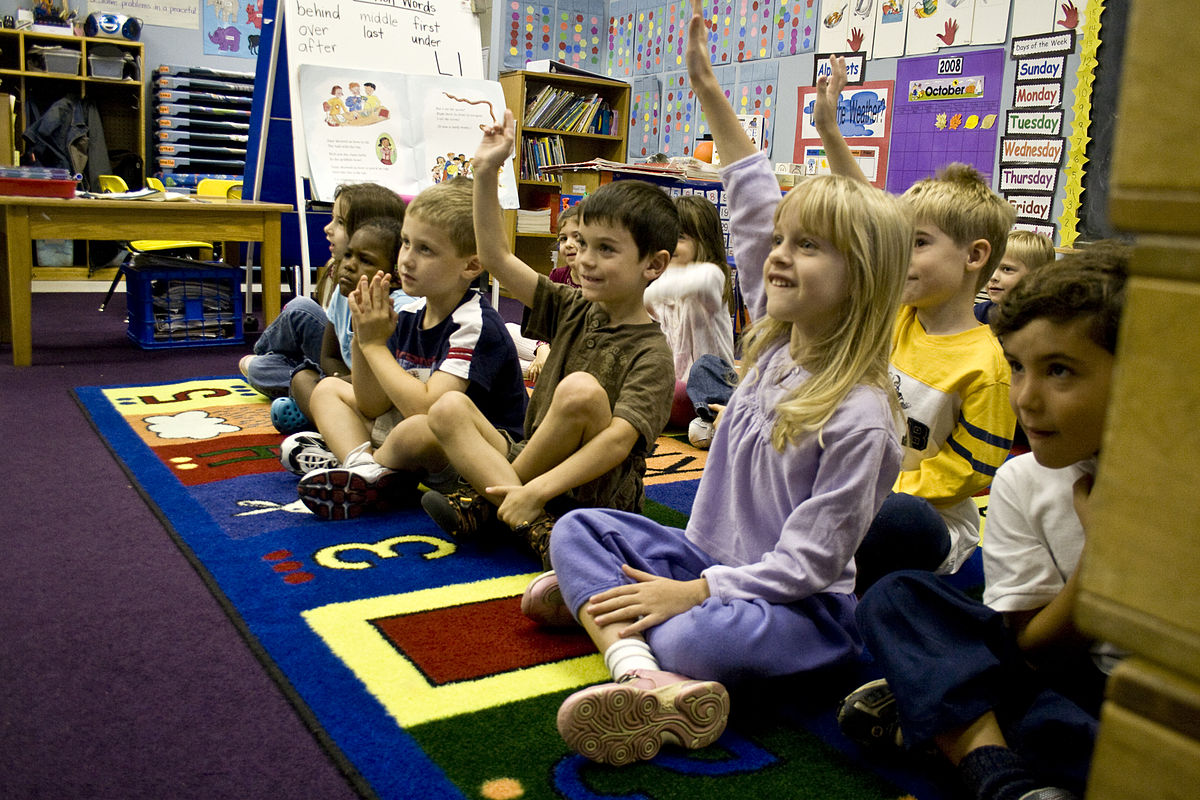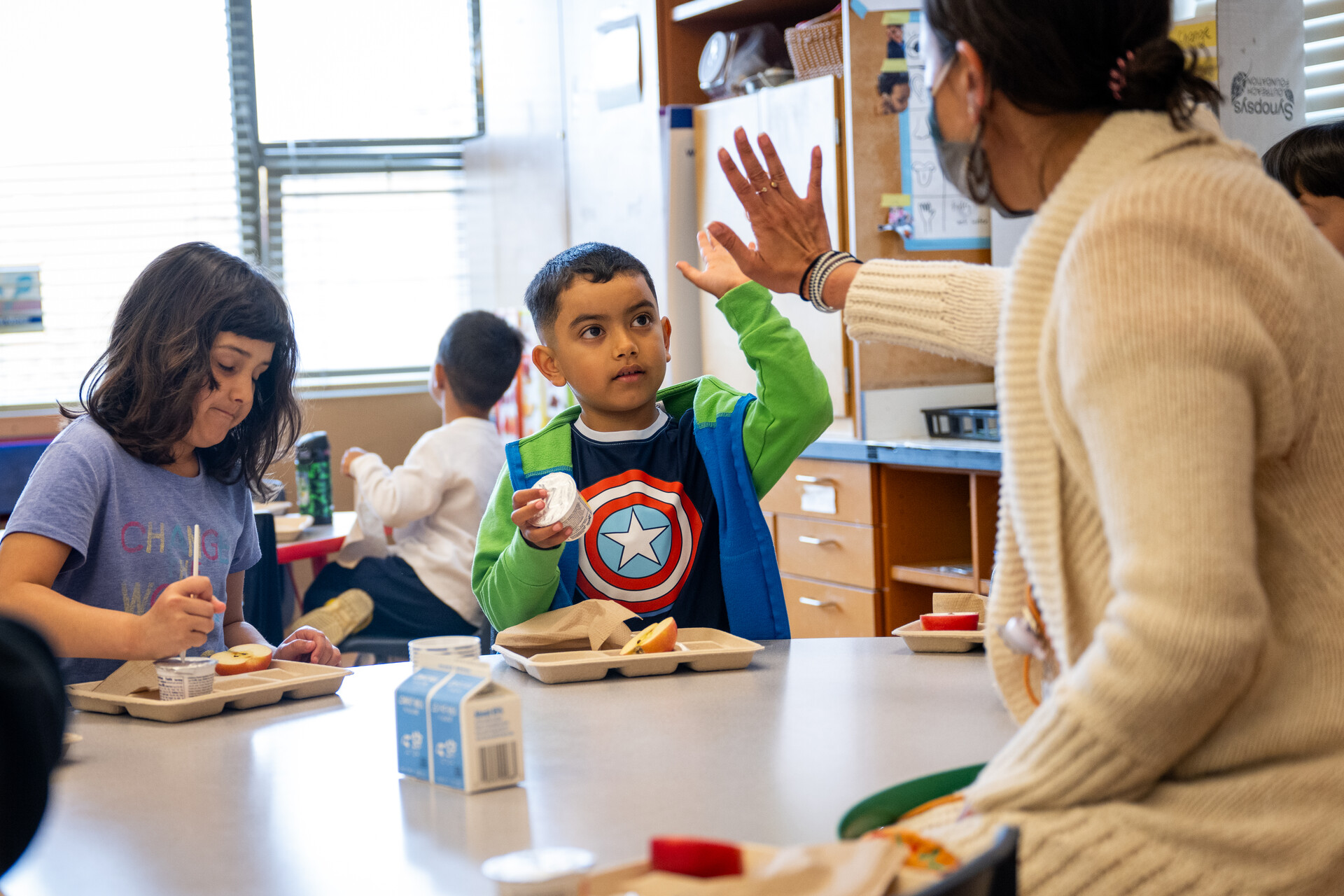Creative storytelling workshops that inspire students in Private School
Wiki Article
The Significance of Interactive Tasks in Elementary School Education
Interactive activities play a vital function in elementary school education and learning. They involve trainees and boost finding out results. With team tasks and hands-on experiments, trainees experience the material in a practical method. This method accommodates diverse discovering designs and promotes essential abilities. However, the benefits prolong past academics. Checking out the much deeper impact of these activities reveals their relevance fit young learners' futures. What improvements occur when trainees actively participate?Enhancing Engagement With Interactive Knowing
Traditional mentor techniques have their values, interactive understanding significantly enhances student involvement in quality institution education. This strategy urges energetic involvement, allowing trainees to immerse themselves in the learning process. By utilizing team tasks, hands-on experiments, and technology-driven resources, instructors create an environment where pupils feel extra linked to the material.Interactive learning promotes cooperation among peers, promoting communication skills and synergy. It likewise satisfies varied understanding designs, making sure that visual, acoustic, and kinesthetic students can all prosper. Trainees are extra most likely to preserve information when they proactively participate, as opposed to passively obtaining knowledge.
This dynamic method not just makes finding out delightful but likewise infuses a sense of possession in pupils concerning their instructional journey. As they involve with the web content, their inquisitiveness and inspiration to learn boost, laying a solid structure for future academic success.
Creating Critical Believing Skills
Interactive knowing not just enhances interaction but likewise acts as a driver for creating important believing abilities in quality school pupils. With activities such as problem-based discovering, debates, and hands-on experiments, students are urged to analyze info, assess different point of views, and develop reasoned final thoughts. These interactive experiences call for students to question assumptions, leading them to assume more deeply concerning different topics.
Furthermore, interactive tasks often present real-world scenarios that challenge students to apply their knowledge creatively. By steering through these challenges, they learn to determine appropriate details and make informed choices. This procedure cultivates not just private essential reasoning but likewise motivates trainees to articulate their assumed procedures, improving their capability to communicate properly. Consequently, interactive learning environments cultivate a generation of important thinkers who are better prepared to tackle complex troubles in their future scholastic and professional ventures.
Promoting Cooperation Among Peers
Fostering cooperation amongst peers is vital in elementary school education and learning, as it enhances team effort and interaction skills. Participating in group activities assists students develop trust and respect for each other, preparing for reliable partnership. Problem-solving together permits pupils to discover from each other and develop a cumulative method to obstacles.Team Effort and Communication Abilities
Effective teamwork and interaction skills are necessary parts of a successful quality school education and learning. Involving in interactive tasks encourages trainees to collaborate, share ideas, and resolve issues with each other. Such experiences promote the growth of vital communication capacities, allowing children to reveal their ideas clearly and pay attention proactively to others. Through synergy, pupils learn to appreciate varied viewpoints, promoting a feeling of community and shared duty. Structured team jobs, whether in academics or imaginative projects, enhance peer interactions, teaching youngsters how to work out roles and solve conflicts. Consequently, these abilities not only add to a favorable class setting however also prepare students for future collaborative endeavors in college and the workplace. In general, team effort and communication are foundational to alternative growth in elementary school.Structure Count On and Respect
Building count on and respect amongst peers works as a cornerstone for effective collaboration in elementary school settings. When trainees really feel valued and valued by their schoolmates, they are more probable to engage proactively in group activities. Interactive activities, such as team projects and participating games, give possibilities for pupils to pick up from each other, promoting a sense of neighborhood. This atmosphere motivates open communication, allowing trainees to express their concepts and point of views without anxiety of judgment. As count on constructs, trainees end up being extra going to share duties and support each various other's understanding. Inevitably, growing an environment of trust fund and regard enhances not just academic end results yet also social growth, furnishing pupils with necessary interpersonal abilities for their future undertakings.Problem-Solving Together
Collaborative analytic involves pupils in vital thinking and teamwork, crucial skills for their personal and academic growth. When trainees interact to deal with challenges, they learn to connect successfully, respect diverse point of views, and leverage each other's strengths. This process enhances their capability to evaluate issues from different angles and create innovative options. Group tasks, such as scientific research experiments or mathematics challenges, advertise active engagement and foster a feeling of community. As pupils work together, they also develop social abilities, discovering to endanger and discuss, which are important for future interactions. Ultimately, analytical together cultivates an encouraging discovering setting, empowering pupils to take ownership of their education and learning while preparing them for collaborative endeavors beyond the classroom.Motivating Creativity and Development
Motivating imagination and advancement in elementary school education and learning can be substantially boosted with hands-on understanding experiences. These tasks permit pupils to engage directly with materials and concepts, cultivating creative reasoning. Furthermore, joint group tasks can boost varied ideas and solutions, further supporting a creative setting.Hands-On Discovering Experiences
A wide variety of hands-on knowing experiences substantially boosts imagination and technology in quality institution education. Involving trainees in functional tasks permits them to apply academic understanding in real-world contexts, cultivating much deeper understanding. By adjusting tools and materials, children create essential analytical abilities and learn to think outside the box. These experiences motivate interest and encourage students to explore their interests better. Furthermore, hands-on activities can link numerous subjects, linking scientific research, art, and mathematics in meaningful means. This interdisciplinary technique encourages trainees to see connections and assume creatively. Eventually, hands-on learning experiences nurture a generation of innovators, outfitting them with the skills and self-confidence required to tackle future difficulties and contribute to society in special Read More Here means.Collaborative Group Projects
Hands-on learning experiences naturally bring about the incorporation of collective team projects, which play an important function in fostering imagination and advancement in elementary school education. These jobs encourage trainees to interact, sharing ideas and point of views, which enhances problem-solving skills and vital reasoning. With collaboration, students discover to connect properly and respect varied point of views, essential skills for their future. Furthermore, team jobs supply opportunities for trainees to try out different functions, boosting their versatility and self-confidence. Involving in this participating setting permits them to discover their creativity, pressing the borders of traditional understanding. Ultimately, collaborative team tasks not just enrich the academic experience however likewise prepare trainees for real-world obstacles that call for team effort and innovative reasoning.Building Self-confidence and Freedom
As students take part in interactive tasks, they frequently discover chances to develop confidence and freedom. These activities, whether they entail hands-on jobs, role-playing, or analytical jobs, motivate trainees to take campaign and express their ideas honestly. By taking part in such experiences, students find out to trust their capacities and make decisions without relying only on support from teachers or peers.In addition, interactive tasks promote a sense of possession over knowing. They develop important believing abilities and durability when pupils tackle obstacles collaboratively or individually. This procedure not just improves their understanding of the topic but additionally empowers them to take dangers in their learning journey.
As they browse different interactive scenarios, trainees progressively shed their insecurity, leading the way for enhanced self-confidence - Kindergarten. Inevitably, these activities play a vital role Recommended Site in supporting confident and independent students, outfitted to deal with future scholastic and personal difficulties
Developing a Positive Class Setting
While fostering a positive classroom environment is important for effective discovering, it calls for willful effort from educators to create a room where pupils really feel secure, highly regarded, and engaged. A positive environment encourages partnership, permitting pupils to reveal themselves without concern of judgment.Educators can attain this by establishing clear expectations, promoting mutual regard, and recognizing specific contributions. Incorporating interactive activities better enhances involvement, making finding out a lot more enjoyable and vibrant.
In addition, a nurturing environment sustains social-emotional development, as pupils discover to browse connections and deal with conflicts. Educators play an important role in modeling favorable actions and reinforcing a society of generosity and inclusivity.
Frequently Asked Concerns

Just How Can Parents Support Interactive Learning in the house?
Moms and dads can sustain interactive discovering in your home by giving interesting materials, encouraging hands-on projects, including academic games, fostering conversations, and developing a nurturing environment that advertises interest and expedition in their children's learning experiences. (Private School)What Kinds Of Interactive Activities Are A Lot Of Efficient?
Hands-on jobs, joint games, role-playing scenarios, and instructional technology applications are among the most effective interactive tasks. These engage pupils, boost critical assuming skills, and promote synergy, inevitably fostering a much deeper understanding of numerous topics.Exactly How Do Interactive Tasks Cater to Different Knowing Styles?
Interactive activities engage aesthetic, auditory, and kinesthetic students by including diverse techniques. These tasks help with recognizing with hands-on experiences, joint discussions, and aesthetic help, allowing pupils to take in information according to their preferred knowing design.What Are the Prices Connected With Carrying Out Interactive Activities?

Implementing interactive activities incurs prices such as materials, training for instructors, technology upgrades, and prospective facility modifications. Budget plan restraints can also affect the frequency and variety of tasks supplied to pupils in instructional settings.
How Can Teachers Evaluate the Influence of Interactive Knowing?
Teachers can evaluate the effect of interactive understanding with observations, trainee responses, performance metrics, and relative analysis of examination ratings before and after implementation, making certain an extensive understanding of interaction and expertise retention improvements.With activities such as problem-based understanding, disputes, and hands-on experiments, trainees are motivated to evaluate info, review different viewpoints, and create reasoned verdicts. Interactive tasks usually present real-world situations that challenge trainees to apply their knowledge artistically. Engaging in interactive activities urges trainees to he said work together, share ideas, and solve issues together. Interactive tasks, such as group tasks and cooperative games, give opportunities for trainees to discover from one another, promoting a feeling of community. As trainees engage in interactive tasks, they often uncover possibilities to construct self-confidence and freedom.
Report this wiki page